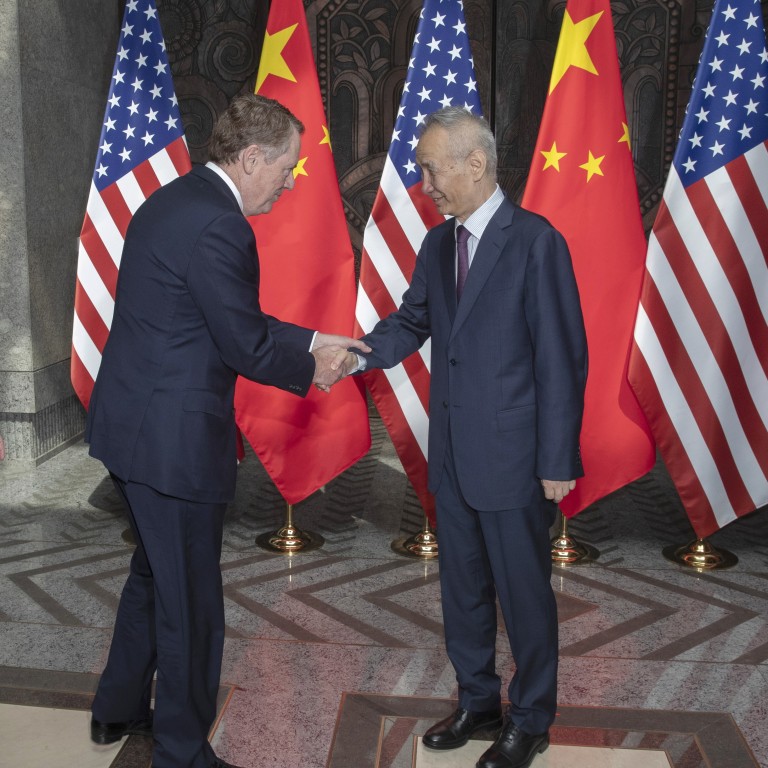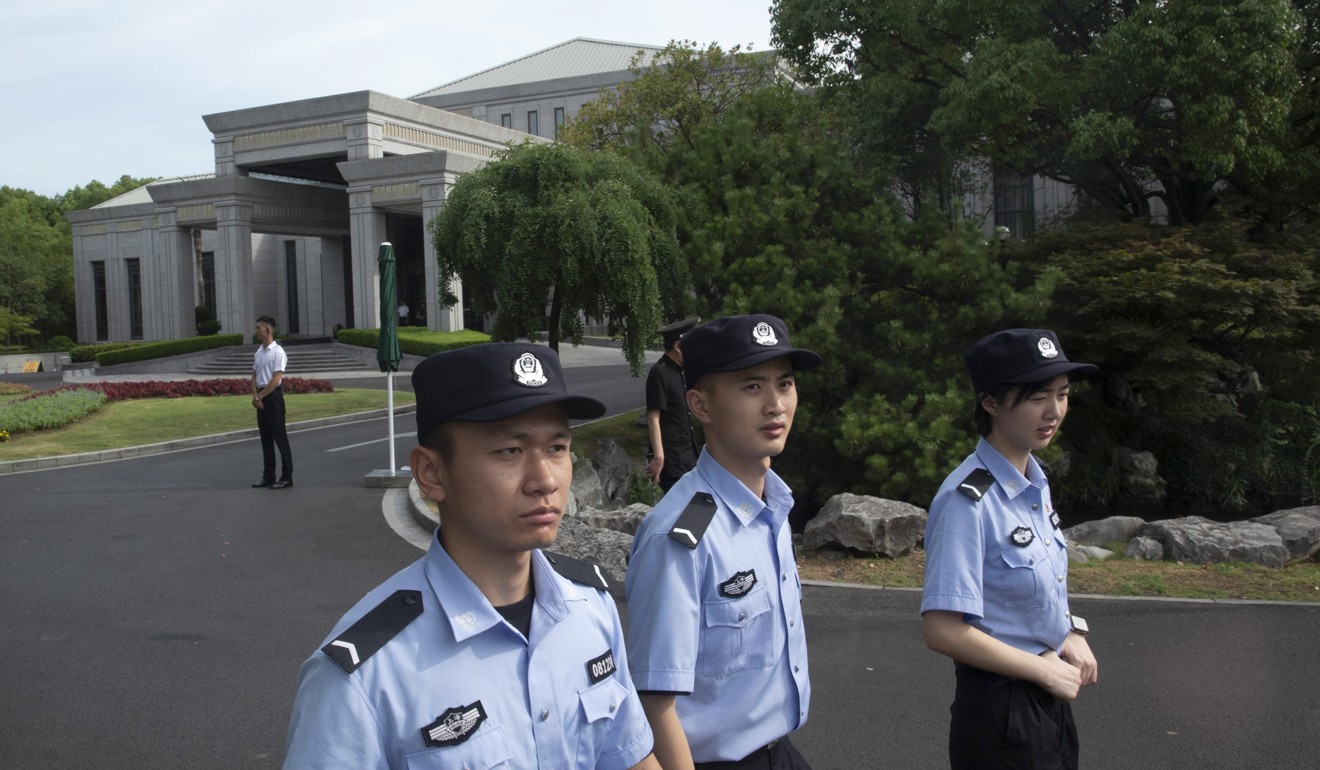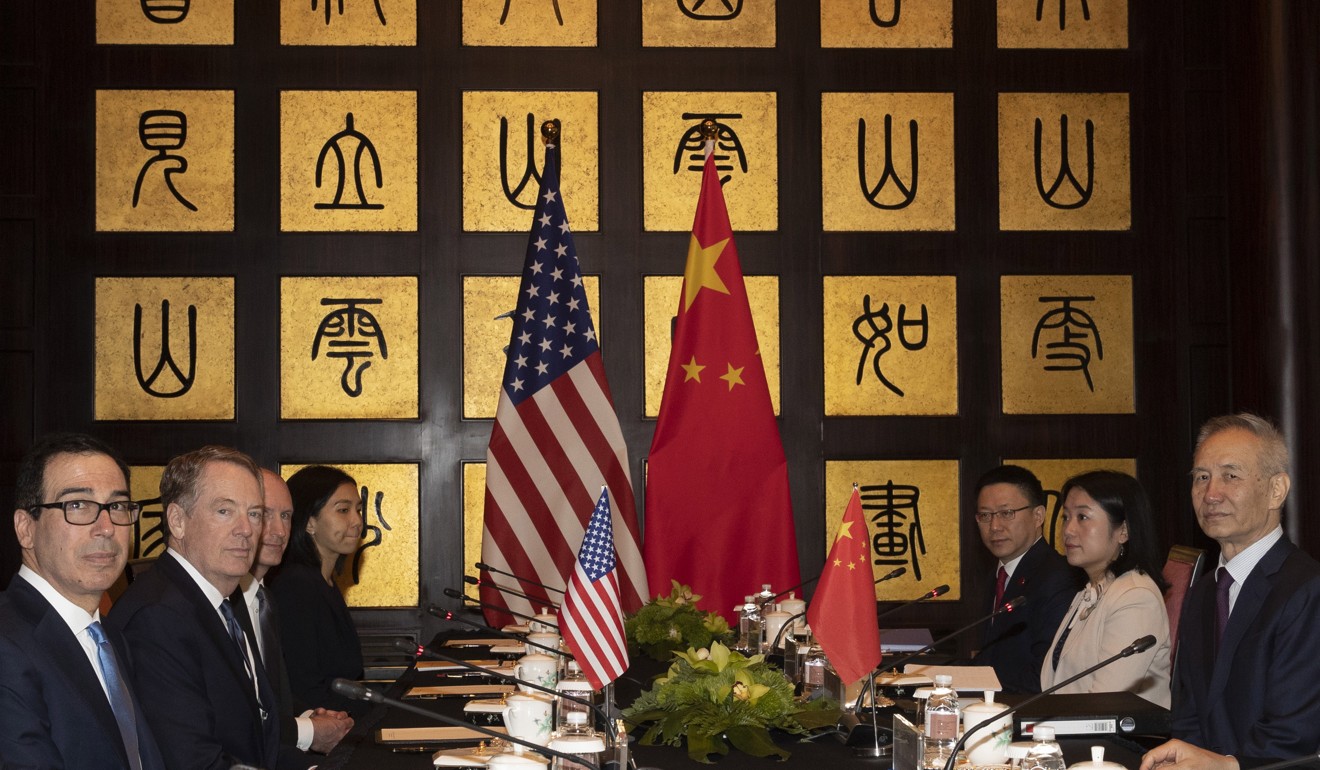
China makes concession on US farm goods in ‘frank’ and ‘constructive’ talks
- First meeting of Chinese and American negotiators for two months wraps up in Shanghai
- For China, the urgency to end the tariff war has lessened, with the economic downturn not as serious as expected
China has agreed to buy more agricultural goods from the United States after “frank, efficient, and constructive” trade talks on Wednesday, the first between the two countries’ top negotiators since discussions were suspended in May.
While the Chinese side did not specify what products it would purchase, it said in a statement it would consider its internal demand, after half a day of discussions in Shanghai on Wednesday, according to official news agency Xinhua. The statement also said the US would “create favourable conditions” for the imports.
The White House, which called this week’s talks “constructive”, said on Wednesday that Chinese negotiators would be travelling to Washington to continue negotiations “on an enforceable trade deal” in early September.
The US delegation arrived in China on Tuesday for a working dinner, with official discussions taking place the next day, and wrapping up early in the afternoon.
While the talks between US Trade Representative Robert Lighthizer, US Treasury Secretary Steven Mnuchin and Chinese Vice-Premier Liu He were closely watched, they were seen as largely symbolic by Chinese diplomatic observers and advisers.
Beyond confirmation from Beijing that it was committed to increasing purchases of US agricultural goods, the White House’s readout made no mention of other outcomes or agreements from the talks.
US President Donald Trump and his Chinese counterpart Xi Jinping agreed in late June to resume talks but there was no time frame for the discussions. That was in contrast to the three-month framework for negotiations that was set at their previous encounter at the G20 summit in Argentina in December.
The avocado strategy: how Africa aims to rebalance trade with China
Before Wednesday’s talks wrapped up, Trump took to Twitter to complain at length that China had not been “coming through” in terms of buying US farm products or in making progress on a deal to end the year-long trade war.
For China, the urgency to end the tariff war has lessened, with the economic downturn not as serious as expected. Beijing is also watching the US presidential race with interest, to see how it will affect trade policy, although it is not relying on a Democrat victory to end the conflict.
“China has started to buy soybeans from the US, which could help Trump to counter domestic political pressure, meanwhile US tech firms have raised their voices to lobby the US administration to loosen export controls on [Chinese tech giant] Huawei,” Peking University international relations professor Wang Yong said.
“Wall Street bankers also hope to invest more in China. If both sides fail to reach a deal, they will lose China’s market which is expected to further open up in the coming years.”
China has started to buy soybeans from the US, which could help Trump to counter domestic political pressure, meanwhile US tech firms have raised their voices to lobby the US administration to loosen export controls on [Chinese tech giant] Huawei
In addition to buying more agricultural products, Beijing might promise to change some of its regulations to make it easier for foreign businesses to operate in the country, according to Pang Zhongying, an international relations expert with Ocean University of China.
But the Wednesday meeting would not go far beyond a signal that they were talking, with neither side rushing for a deal, he said.
China can turn trade war ‘crisis into an opportunity’
“The difficult issues facing their trade relationship will not be overcome immediately,” he said, adding that while Beijing considered it unrealistic to wait for a Democrat to unseat Trump – an accusation made by Trump on Twitter – the Chinese leadership was assessing whether there would be any change in US-China policies during and after the presidential election.
“If Trump is re-elected, he may face less election pressure and negotiations may be less tough.”
Wei Jianguo, a former Chinese vice-minister of commerce, agreed that the prospects for negotiations could be clearer after the US election.
“Right now, the most important thing for Trump is the election,” he said.

Wei also said the Chinese economy was not as bad as expected – with 6.2 per cent growth recorded in the second quarter, while the US economic outlook was not good.
“All of this will complicate the next steps in trade between both sides. But, right now, Trump needs something significant to stimulate and prove himself,” he said.
Trade war continues to depress factory owners’ outlook in China
Wei said it was impossible for China to buy US products at a high cost and that negotiations should be based on mutual respect.
“We cannot see the negotiations this time as being able to resolve the problems, but we need to see how we can use these talks to build mutual trust, to resolve the mistrust between both sides,” he said.
A Chinese government adviser said Trump needed a good deal to strengthen his presidential campaign and counter downward economic pressure, while China’s overall economy was not as bad as expected.
“There won’t be a deep fall in the economy even if Trump imposes tariffs on the rest of Chinese exports to the US. As long as China’s bottom line remains, China is willing to see a deal,” he said.
Trump goads China over record low GDP growth rate
Beijing wanted to see the removal of tariffs and an enforcement mechanism that showed dignity to China, the adviser said.
“If the US can lift the tariffs in some form, China can make a promise in enforcement. The talks in Shanghai could be merely a formality, but I hope there will be a breakthrough by the end of the year.”

He said also that Trump and Lighthizer each had different goals in the trade talks, with the president focused on direct interests – such as Chinese purchases of American goods – and the trade representative prioritising system changes in China.
“The protracted trade talks will only exacerbate their conflicts,” he said. “China played tough by standing firmly against the US in the past couple of months and this has impacted the US.”
Trade war or not, China is still a manufacturing superpower
China had earlier asked the US to remove all tariffs as a precursor to a deal and said any agreement must not undermine its sovereignty. The US, meanwhile, insisted on a forcible enforcement mechanism, such as a change in Chinese law, and insisted on keeping tariffs in place until it was satisfied China had delivered on its commitment.
Wang said the US and China had different styles to address problems, with the US trusting in legislation to validate any agreement, while China relied on administrative orders to make changes. But he did not regard them as insurmountable.
“The US and China can find a middle ground to solve the enforcement issues,” he said.
Xinhua reported that the Chinese negotiating team included Commerce Minister Zhong Shan, People’s Bank of China Governor Yi Gang, vice-minister of commerce Wang Shouwen, National Bureau of Statistics director Ning Jizhe, vice-minister of finance Liao Min, vice-minister of foreign affairs Zheng Zeguang, vice-minister of industry and information technology Wang Zhijun, and deputy director of the Central Agricultural Office Han Jun.
Additional reporting by Owen Churchill.



